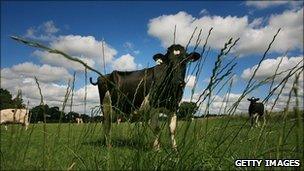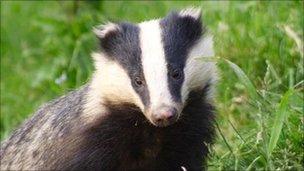England farmers 'live with' bovine TB slaughters
- Published

Cows are routinely tested in areas considered high risk for bovine TB
Bovine tuberculosis is a major problem for farmers in England and led to the slaughter of almost 25,000 animals last year - but what's it like to run a farm affected by the disease?
David Moreton, a dairy farmer near Wotton-under-Edge, Gloucestershire, knew what would happen when 12 of his cows reacted positively to bovine tuberculosis tests last month.
The animals were taken away to be slaughtered and in the first post-mortem tests, nine out of 10 were found to have TB lesions on their glands.
Last year, five of his cows were slaughtered after they were also classed as "reactors" after reacting to routine skin tests.
Mr Moreton's 300 organic milking cows are routinely tested for TB because the farming area, stretching between Bristol and Cheltenham, is considered high risk for the disease.
He has been a cattle farmer for 35 years and sees an outbreak of bovine TB every couple of years and said each time it was upsetting.
"Every one or two years we have a problem and if we don't have a problem one of our neighbours does," he said.
"It's something we live with."
'Life and death'
Last year, a total of 24,899 cattle in England tested positive for bovine TB. All were slaughtered, in line with government policy in place because the bovine bacterium can also cause human TB.
In 2009, 25,557 cows had to be slaughtered, under the the bovine TB control measures. The West and South West are the worst affected parts of England.
In one of the latest outbreaks on a farm near Penrith, Cumbria, 80 cows were slaughtered and a further 20, also classed as reactors, were due to be killed.
The government pays compensation to farmers whose cattle have been slaughtered to control the disease, ranging from £132 to £1,665 per animal, depending on its age and type.
A total of £63m was spent dealing with bovine TB in 2009/10 and the government said it recognised the disease had a "devastating effect on many farm businesses and families".
Last year, the Department for Environment, Food and Rural Affairs (Defra) begun a public consultation on tackling the disease. The result will soon be published.
Mr Moreton said: "On a farm you see life and death every day.
"This disease is out of your control and when there's an outbreak you do understand the animals need to be killed.
"But in the last outbreak we lost animals which were three to four years old - at the peak of their production life. We would have spent two to three years just rearing them with no income."
'Keep morale up'
Mr Moreton said it had been a long-term problem in Gloucestershire, and he had lost 10 to 20 cows in each outbreak on his farm.
"It is upsetting. I have four employees and I have to keep morale up and reassure them it is not their fault and that we have to keep going," he added.
Like many farmers, Mr Moreton believes badgers are the "prime culprit" behind bovine TB. He said among evidence was that when badgers were culled in the area the disease was much less widespread, but it had become "worse and worse" in the last 10 to 15 years.
He said bovine TB was also known to spread from other cattle, but he had not brought any cattle, apart from a breeding bull, which was safely sourced, on to his farm for years.

Many farmers consider badgers cause outbreaks of bovine TB
Mr Moreton said he would like to see badgers humanely culled in affected areas, but believed vaccinating cattle against the disease would be the best long-term solution when a cow vaccine becomes available.
In the government consultation, the National Farmers' Union (NFU) has backed a proposal to curb the disease by licensing farmers to tackle TB on their land by killing badgers or vaccinating them.
Ministers have said this was also their "preferred approach".
However, badger culls have been passionately opposed by a range of animal welfare groups who say research has found no link between the species and bovine TB.
The Badger Trust says that government research over decades "had yet to determine how badgers infect cattle" and insisted that instead the badgers "very often" caught the disease from cows.
Meanwhile, some scientists say a badger cull could make the problem worse because it could cause badgers to roam further.
A Defra spokesman said no decision on badger control had yet been taken.
"We received a large number of responses to the public consultation which will be considering carefully in order to make the best decision," he said.
"We will announce our decision as soon as possible as part of a comprehensive and balanced TB eradication programme for England."
- Published28 April 2011
- Published20 April 2011
- Published31 March 2011
- Published23 March 2011
- Published1 December 2010